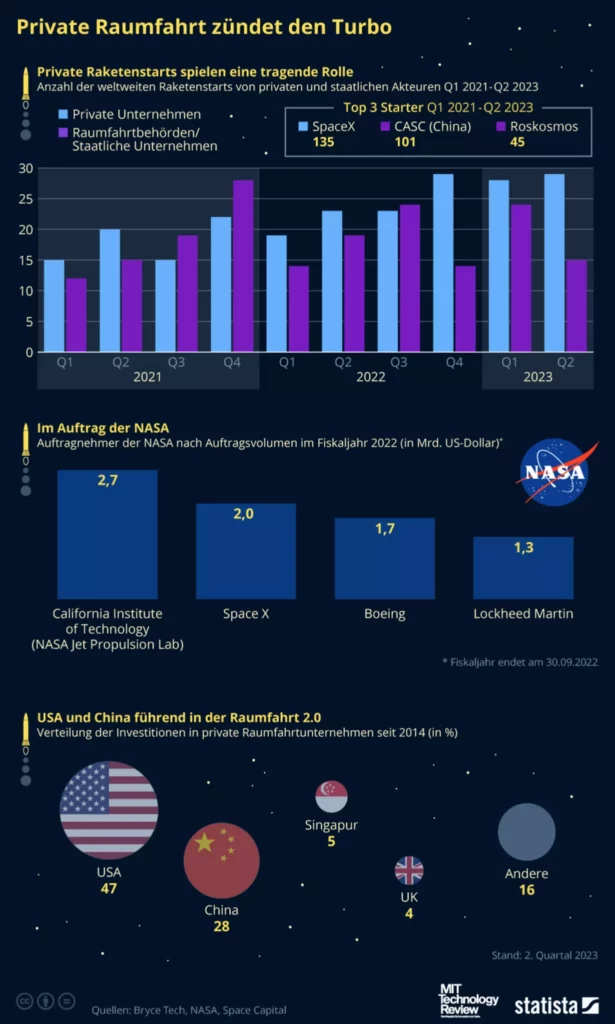What is space law – and space criminal law?
Juristically, the airspace above state territory is “domestic” in the sense of criminal law. However, this airspace ends at a certain altitude, where it becomes outer space. It is not clear where this boundary lies, but from an altitude of 80 kilometers, it is clear that space begins at 110 kilometers at the latest. This is not subject to any state sovereignty, is thus – at least spatially considered – not legally regulated.
If one asks for a space criminal law, the easy way is to think of space vehicles – these will be subject under international law to the sovereignty of the state for which they appear. It is therefore argued in the literature that one should explicitly extend the “flag principle” to spacecraft in §4 StGB and, moreover, that one should already do so in the interpretation. Otherwise, it applies to international space missions that each participating state has sovereignty over its property and its nationals.
Space law as a legal field currently exists probably more in legal theory than in practice. Serious problems arise in this context, which are currently still rather marginal: For example, on the protection of industrial property and the question of the protection of intellectual property of discoveries/inventions in outer space, which today can already partly be subject to national law.
Exemplary aspects of space law
Space Law
Since there is no national space law, space law is part of international law. The core element is the Space Treaty of 27. 1. 1967.
Liability
Of course, the question of liability must somehow be clarified, at least fundamentally. Here, the Outer Space Ordinance and the Outer Space Liability Convention are to be mentioned. The here (roughly) conceived liability system provides for a strict liability or a fault liability, depending on the place of damage (earthly or in space).
War & Cybercrime
How do you deal with hackers – possibly also on behalf of the state – attacking systems in space, such as satellites? Or use satellites to target earthly targets via connections running over them?
Lawyer for space criminal law and space law
- Specialist lawyer in IT law and criminal law, who loves legal issues of new technologies and technology in general
- Of course, no experience whatsoever in the courtroom with space law – as well as
- Extensive involvement with space law issues for many years, especially around technological and criminal aspects.
- Where technology and criminal law meet is in the area of cybercrime – specializing in cybercrime, it would be fatal not to see the threat of satellite-based connectivity here!

Space Criminal Law
Is there an original space criminal law?
There is no real, original criminal law for outer space in the sense that there is a directly created criminal law for outer space. There are some, very specific, special rules, for example if one operates a satellite system without the required authorization, which generates data about the Earth with a particularly high information content, which constitutes an administrative offense (see for example § 28 I Nr. 1 Satellitendatensicherheitsgesetz, “SatDSiG”).
However, there is a bridge to national criminal law: In the case of criminal offenses with a special domestic reference, criminal liability “abroad” can arise via §5 StGB, in the case of expressly named and particularly serious offenses. The term “abroad” covers everything that is not German territory, and according to the prevailing opinion in the legal literature, outer space is included without any problems.
Cybercrime in space
RA JF specializes in cybercrime – of course, the connection to space, with communications and surveillance via satellites is perfectly obvious.
Attacks that are coordinated against the home country and are only carried out via the “tool” in space are certainly well within the reach of national criminal law. Cases will be exciting in which, at the same time, directly intended or not, damage is caused to the respective property in space by the attack – which was intended to cause damage elsewhere on Earth.
Commitment in space
Engagement in space is of strategic importance to nation states and especially to supranational entities such as the EU. Engagement in space is of strategic, economic and scientific importance to nation states and the EU as a whole. Neglecting this sector could lead to geopolitical, economic, and security disadvantages. It is therefore crucial to invest in space technologies and missions and to play an active role in space, in particular in the areas of
- Science and Research: Space offers unique opportunities for scientific research, from exploring other planets and stars to exploring Earth from orbit. This research can expand our understanding of the universe and lead to breakthroughs in physics, biology, and other sciences.
- Technological innovation: The challenges of space flight have led to numerous technological advances, many of which also have applications on Earth, such as in medical technology, communications technology and materials science.
- Economic Opportunities: Space offers economic opportunities ranging from satellite services to space tourism to the possible mining of resources on asteroids or other celestial bodies.
- Geopolitical and Strategic Significance: Space is a strategic area used for defense, communications, and surveillance. Active engagement in space can provide geopolitical advantages to a state or union.
- Environmental Monitoring and Climate Change: Satellites play a critical role in monitoring climate change, the oceans and the environment as a whole. They provide valuable data for developing strategies to protect our planet.
- Inspiration and Education: Space missions inspire people worldwide and foster interest in science, technology, engineering and mathematics.
- Dangers of Neglect: If states or entities like the EU neglect space, they could lose geopolitical influence while other actors expand their presence and power in space. Without their own space capabilities, countries or entities could become dependent on other states, whether for satellite services, space exploration, or defense. Moreover, the space industry is a growing sector with great economic potential. Lack of commitment could cost economic opportunities. Finally, space is becoming increasingly militarized. Lack of presence or capability in space could increase security risks.

Space travel by companies
It can be assumed that space travel in the future will be supported primarily by the private sector. At the same time, commercial spaceflight offers high economic value on the one hand, while on the other it is precisely for this reason that it is the focus of legislative attention. Germany, for example, has announced a Space Act to address the regulation of private spaceflight (see “Space Strategy” below). It is to be expected that this will focus from the outset on (IT) security, but also on sustainability in terms of environmental compatibility. It is foreseeable that the approval and testing effort in the EU will increase.
Anwaltskanzlei Ferner Alsdorf

Our law firm specializes in criminal defense and IT law, especially on issues of cybercrime and digital evidence – out of conviction. This website was created out of interest in the topic of space criminal law, which attorney Jens Ferner deals with.
Our Qualification: RA DF has been a specialist lawyer for criminal law for over 20 years; RA JF is a double specialist lawyer, commentator in a renowned commentary on the German Code of Criminal Procedure (StPO), trainee lawyer for the Higher Regional Court of Cologne + lecturer at the Lawyers’ Academy.
Kanzleiwebseite | Kontakt | Impressum | Datenschutzerklärung
Space Strategy of the German Federal Government 2023
The German government has repositioned itself in 2023 and named its space strategy with key projects
Competition & Regulation
Free and independent access to space is, in the government’s view, an essential element of Europe’s strategic sovereignty and thus indispensable for the realization of our political, economic and societal goals in the use of space. In a new global space environment, a new, sustainable approach to the development and procurement of launch services in Europe is required: towards more intra-European competition between private companies.
It is about a paradigm shift in the development and procurement of launcher services in Europe: A European launcher competition is to enter into a competitive model of launcher procurement. This will pave the way for efficient and independent access to space based on fair competition. The principles of sustainability will be integrated throughout the entire life cycle, from the development and production of the launcher to its sustainable operation on the ground and on its way into space.
The German government is also striving for a national space law that will contribute to the sustainability of space activities by, among other things, making licensing and control of space activities mandatory. Legal regulations should also contribute to reliability and to an innovative and competitive location for space companies. In addition, the inclusion of security-relevant aspects is being examined in the drafting of the Space Act.
Participation in international missions and Space Innovation Hub
NASA is identified as an important partner (Mission Grace) as well as Japan (Mission Destiny+). In addition, there is a need for more exchange between public sector users and providers of space services. Procurement processes should become more innovative and transparent, and synergies should be exploited to a greater extent. For this reason, the German government will initiate a platform via the German Space Agency. This Space Innovation Hub will serve as a contact point for the NewSpace scene to develop innovative project ideas and implementation options together with civilian and military players.
The “return” to the moon is also to take place within this framework.
Small satellites
In the view of the German government, small satellites are the engine of the future space market – and a great opportunity for the German space industry, especially for start-ups. That is why the Small Satellites Initiative is being driven forward to pave the way for a closed value chain in Germany. German SMEs and start-ups will be supported in assuming a good competitive position in this market, especially in the development of innovative technologies and services. Research institutions and universities as innovation drivers and breeding grounds for NewSpace approaches will also be taken into account.
Climate and space
Specifically, Germany, in cooperation with UNEP, wants to support the implementation of the goals of the “Methane Pledge” (COP-26, Glasgow) on the level of monitoring and data provision within the framework of the “International Methane Emissions Observatory (IMEO)”. The aim is to create a service for national and European users to verify methane emissions in a targeted manner and ultimately to reduce them systematically.
Furthermore, the potential of earth observation data for natural climate protection (e.g. conservation and renaturation of peatlands and floodplain landscapes) in Germany is to be tapped. To this end, an integrated greenhouse gas monitoring system for Germany is being established. High-resolution satellite measurements of atmospheric greenhouse gas concentrations will enable the quantification of the emission intensity of local CO2 and CH4 sources from space and the improvement of the data flow to finally provide regular source-sink estimates of greenhouse gases on nationally relevant scales by means of a data assimilation and inversion system. Starting with a CO2 monitoring mission from 2026, the Copernicus satellite fleet will be complemented by six additional extension sentinel missions by 2028, which will significantly support the European Green Deal and European climate goals, and will also ensure Europe’s global leadership in Earth observation in the future.
Building on the already existing national and European platforms, the reliable, efficient and user-friendly provision of satellite data and processing tools via cloud platforms is to be further advanced in order to enable, among other things, users from public institutions and science, but also service providers, to have fast, simple and efficient access to globally available Earth observation data, as well as their secure cloud-based processing and integration with their own data.
Space situational picture
The ability to create a space situational picture is an elementary basis for measures to protect space systems and thus for nationwide action in space. The National Security Strategy emphasizes the importance of space situational awareness as a joint civil-military task. In order to ensure the operational availability of an up-to-date and independent space situational picture, we will ensure the development and expansion of national capabilities, including sensor technology, and the operation of the joint interdepartmental space situational awareness center by 2030. In doing so, the existing competencies of research and federal institutions will be expanded. Germany will continue to play a leading role in the EU SST partnership and establish a catalog and service availability for monitoring all relevant Earth orbits.
Space Traffic Management
The number of objects in space is increasing rapidly. Unlike in air traffic, where air traffic control ensures that all aircraft are always at a sufficient distance from each other, there is as yet no corresponding coordination body for outer space. Due to the physical differences, approaches from air traffic are not easily transferable to space traffic. In order to avoid collisions in space, the European Union has developed a political approach to space traffic management, which takes into account in particular the improvement of the EU’s independence in the field of observation and tracking of space objects by the EU Member States, which already cooperate in the EU-SST partnership. Based on the services that EU SST provides free of charge to satellite operators worldwide, collision hazards can be detected and avoidance maneuvers can be performed, among other things.
Germany will actively support the implementation and international representation of the EU approach to STM and has advocated the establishment of an international STM system within the framework of the United Nations. Implementation of Germany’s position requires consistent expansion of national capabilities as well as bilateral and multilateral networking of Germany in the area of space surveillance with civilian and military partners. The continuation of our leading role in the EU SST will be pursued in close coordination with France.
- Understanding cyber diplomacy as a strategic necessity - 19. June 2025
- Israel and Iran: Cyber Espionage, Cyber Warfare and Cyber Defense in Comparison - 19. June 2025
- Israel: Cyber Espionage, Cyber Warfare and Cybersecurity - 19. June 2025

